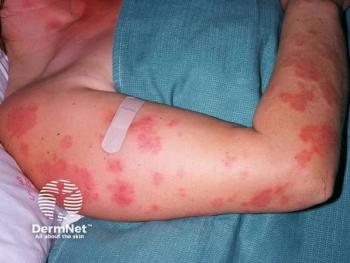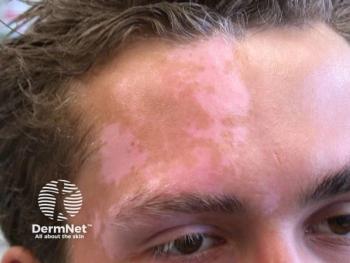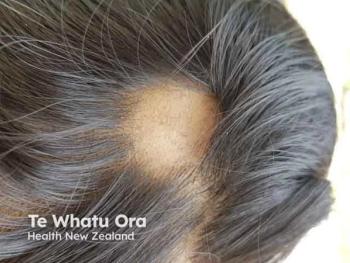
Upadacitinib Receives FDA Approval for Active Psoriatic Arthritis
The FDA approves upadacitinib (Rinvoq; AbbVie) for the treatment of adult patients with active psoriatic arthritis.
AbbVie has announced the FDA approval of upadacitinib (Rinvoq; AbbVie) 15 mg, once daily, for the treatment of adult patients with active psoriatic arthritis (PsA) who have had an inadequate response or intolerance to 1 or more tumor necrosis factor (TNF) blockers.1
This approval comes after a delay from a previous action date in June 2021. The atopic dermatitis indication for upadacitinib remains unapproved at this time. It is an oral JAK Inhibitor, and
"The efficacy of Rinvoq in relieving the many manifestations of psoriatic arthritis is well-characterized in two large, long term clinical studies," said Michael Severino, MD, vice chairman and president, AbbVie, in Chicago, Illinois. "This new approval underscores our mission to deliver a portfolio of therapies that can help more people with rheumatic diseases achieve disease control."
This approval was supported by data from the phase 3 trials SELECT-PsA 1 (NCT03104400) and SELECT-PsA 2 (NCT03104374). These pivotal studies assessed the efficacy, safety, and tolerability of upadacitinib in patients with PsA. Both studies demonstrated patients treated with 15 mg upadacitinib had a consistent safety profile with patients who were being treating for rheumatoid arthritis.
"Many adults still struggle to find a treatment option that helps them lower their disease activity," said Iain McInnes, professor of medicine and Versus Arthritis professor of rheumatology at University of Glasgow, UK, and lead investigator of the SELECT-PsA 1 trial. "With this FDA approval, Rinvoqhas the potential to help more people find meaningful relief from the signs and symptoms of psoriatic arthritis that they see and feel and to help reach their treatment goals."
In SELECT-PsA1 and SELECT-PsA 2, upadacitinib met is primary endpoint of American College of Rheumatology (ACR)20 responses (71% and 57%, respectively) versus placebo (36% and 24%, respectively).
Joint Efficacy1
- In the SELECT-PsA 1 and SELECT-PsA 2 Phase 3 clinical trials, patients treated with upadacitinib 15 mg achieved higher ACR50 responses (38% and 32%, respectively) at week 12 compared to placebo (13% and 5%, respectively).
- Patients in the upadacitinib arm across the SELECT-PsA 1 and SELECT-PsA 2 clinical trials achieved higher ACR70 responses (16% and 9%, respectively) compared to placebo (2% and 1%, respectively) at week 12.
- Findings showed the upadacitinib treatment resulted in improvement in dactylitis and enthesitis in patients with those pre-existing conditions.
- In SELECT-PsA 1, treatment with upadacitinib 15 mg significantly slowed the progression of structural joint damage (-0.02 change from baseline) compared to placebo (0.23) as assessed by the change from baseline in modified Total Sharp Score (mTSS) at week 24.
Physical Function1
- In both trials, patients in the upadacitinib arm achieved significant improvement in physical function from baseline compared to placebo as assessed by Health Assessment Questionnaire-Disability Index (HAQ-DI) at week 12.
Fatigue1
Patients in both trials in upadacitinib 15 mg treatment experienced significantly greater improvement from baseline in fatigue, as measured by the Functional Assessment of Chronic Illness Therapy – Fatigue (FACIT-F) score, at week 12 compared to placebo.
Skin Response1
- Treatment with upadacitinib 15 mg resulted in improvement in skin manifestations in patients with PsA, but it has not been studied in and is not indicated for the treatment of plaque psoriasis.
Safety1
- The safety profile observed in patients with active PsA treated with upadacitinib 15 mg was consistent with the safety profile observed in patients with rheumatoid arthritis. During the 24-week placebo-controlled period, the most common adverse events (AEs) reported with in the active upadacitinib treatment arm were upper respiratory tract infection and blood creatine phosphokinase elevations.
- The frequencies of herpes zoster and herpes simplex were 1.1% and 1.4%, respectively, with upadacitinib 15 mg and 0.8% and 1.3%, respectively, with placebo. A higher incidence of acne and bronchitis was also observed in patients treated with upadacitinib 15 mg (1.3% and 3.9%, respectively) compared to placebo (0.3% and 2.7%, respectively).
Reference:
1. FDA approves Rinvoq for patients with active psoriatic arthritis. Accessed December 15, 2021. https://www.healio.com/news/rheumatology/20211215/fda-approves-rinvoq-for-patients-with-active-psoriatic-arthritis
Newsletter
Like what you’re reading? Subscribe to Dermatology Times for weekly updates on therapies, innovations, and real-world practice tips.











